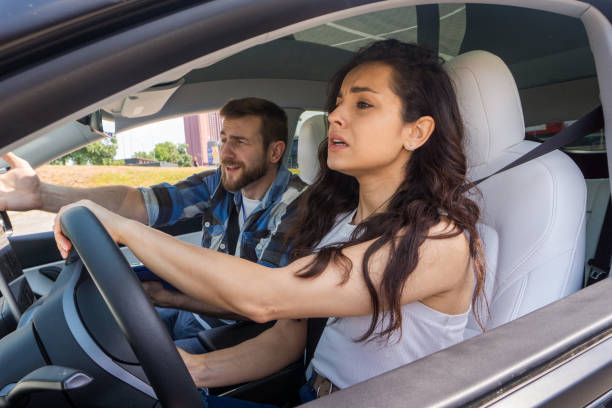Learning to drive is a pivotal moment in many people’s lives, marking the transition to greater independence and responsibility. However, deciding whether to learn from your parents or to enroll in a professional driving school can be a challenging choice. Each option comes with its own set of advantages and disadvantages that can significantly impact your driving skills and confidence on the road.
In this article, we’ll explore the pros and cons of both learning from your parents and from a driving school, helping you make an informed decision that best suits your needs and circumstances.
The Pros and Cons of Learning Driving From Parents
Learning to drive from parents is a common practice that offers both advantages and drawbacks. Understanding these pros and cons can help aspiring drivers make an informed decision about their driving education.
Pros:
One of the most significant advantages of learning to drive from parents is cost savings. Professional driving lessons can be expensive, while parental instruction is usually free. This makes it a budget-friendly option for many families. Additionally, the flexibility of scheduling driving lessons with parents is another benefit. Parents can adjust their schedules to fit around school or work commitments, making it easier to find time for practice.
Another positive aspect is the personalized attention that parents can provide. They understand their child’s learning style and pace, allowing them to tailor the instruction accordingly. This can lead to a more comfortable and supportive learning environment, reducing the stress and anxiety often associated with driving for the first time. Furthermore, practicing in a familiar car and environment can boost the learner’s confidence.
Cons:
However, there are notable disadvantages to consider. Parents may not be up-to-date with the latest traffic laws and driving techniques, potentially passing on outdated or incorrect information. This lack of professional training can hinder the learner’s ability to develop proper driving skills. Additionally, parents might inadvertently teach bad driving habits that they have developed over the years.
The emotional dynamics between parents and children can also pose challenges. Tensions and frustrations can arise, making the learning process stressful and less effective. Moreover, parents might not cover the full scope of necessary driving skills, including advanced and defensive driving techniques, which are typically emphasized in professional driving lessons.
Learning from a Driving School: Pros and Cons
Enrolling in a driving school for driving lessons is a popular choice for many new drivers. While this option offers structured and professional training, it also comes with its own set of advantages and disadvantages. Here are some key pros and cons to consider when deciding whether to take driving lessons from a driving school.
Pros:
- Professional Instruction: Instructors are certified professionals who are well-versed in the latest traffic laws and safe driving techniques. Driving schools provide a structured curriculum that ensures all essential driving skills are covered, from basic maneuvers to advanced techniques.
- Comprehensive Training: Driving lessons include a range of scenarios, including defensive driving, emergency handling, and complex traffic situations, which might be overlooked in informal instruction. Many driving schools offer simulators and controlled environments for safe practice.
- Objective Feedback: Professional instructors provide unbiased, constructive feedback, helping learners to correct mistakes and improve their skills effectively.
- Instructors can identify and address specific areas where the learner needs improvement.
- Insurance Benefits: Completing a driving school course can often lead to lower insurance premiums and provide certification that can be advantageous when applying for a driver’s license.
Cons:
- Cost: Driving lessons from a professional school can be expensive, which may be a barrier for some learners. Additional fees for materials, tests, and certification might also add to the overall cost.
- Fixed Schedules: Driving schools often have fixed class schedules, which may not be as flexible as learning with a parent or guardian. Coordinating these schedules with other commitments, such as school or work, can sometimes be challenging.
- Impersonal Learning Environment: Some learners might feel less comfortable and more anxious with a professional instructor compared to learning with a parent. The structured setting of a driving school might not cater to the individual learning pace and style of every student.
While driving schools provide comprehensive and professional driving lessons that ensure a thorough understanding of road safety and driving skills, they also involve higher costs and less flexible scheduling. Weighing these pros and cons will help you decide the best approach for your driving education.
The Final Verdict
In conclusion, deciding whether to learn to drive from your parents or to enroll in a driving school for professional driving lessons depends on your individual circumstances and priorities. Learning from parents can offer cost savings, flexibility, and a supportive environment, but it may also come with outdated information and potential stress. On the other hand, driving schools provide structured, professional instruction that covers all necessary driving skills and offers objective feedback, although they can be costly and less flexible. By carefully considering these pros and cons, you can choose the driving education path that best suits your needs, ensuring a confident and safe driving experience.

![Find Lost or Missing Files on Windows 11 [Quick Methods]](https://itsreleased.co.uk/wp-content/uploads/2024/05/Find-Lost-or-Missing-Files-on-Windows-11-Quick-Methods-150x150.jpg)
